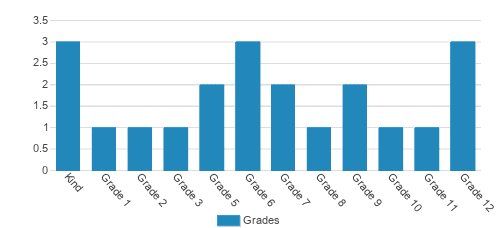The Gospel Lighthouse Christian Academy provides a well-balanced education in a Christian environment.
At the Gospel Lighthouse Christian Academy, we use the Bob Jones University Press curriculum for Bible, Spelling, English, Handwriting, History and Science.
In addition to being excellent learning material, it is also Biblically integrated.
In every subject there are overt references to Scripture. The textbooks concentrate on critical thinking skills that will lead to students truly learning the knowledge to succeed in life.
The curriculum is flexible enough to meet each student's individual needs.
We have found Bob Jones University Press to be both fun and challenging.
For Mathematics, we have chosen Saxon Curriculum. We have found that Saxon Curriculum challenges the students to learn math from the inside out.
We desire for each student to be challenged in his or her work.
Quick Facts (2026)
- Grades: 9-12
- Enrollment: 14 students
- Application Deadline: None / Rolling
- Source: National Center for Education Statistics (NCES)
School Overview
Religious Affiliation
Grades Offered
Grades 9-12
Student Body
Total Students
14 students
Student Body Type
Co-ed
% Students of Color
27%
State avg.: 41%
Students by Grade

Academics and Faculty
Total Classroom Teachers
1 teacher
Student-Teacher Ratio
14:1
National avg.: 13:1
Tuition and Acceptance Rate
Admission Deadline
None / Rolling
Source: National Center for Education Statistics (NCES)
Frequently Asked Questions
What schools are The Gospel Lighthouse Christian Academy often compared to?
The Gospel Lighthouse Christian Academy is often viewed alongside schools like Lockhart Montessori School by visitors of our site.
When is the application deadline for The Gospel Lighthouse Christian Academy?
The application deadline for The Gospel Lighthouse Christian Academy is rolling (applications are reviewed as they are received year-round).
School Reviews
Endorse The Gospel Lighthouse Christian Academy. Endorsements should be a few sentences in length. Please include any comments on:
- Quality of academic programs, teachers, and facilities
- Availability of music, art, sports and other extracurricular activities
- Academic or athletic awards
Recent Articles

Navigating Private School Finances 2026
Essential 2026 guide for parents on private school costs, financial aid, and planning strategies.

Preparation for Standardized Tests & College Admissions 2026
A 2026 guide for private school test prep and college admissions strategies, with insights, trends, and best practices for families and educators.

Mental Health & Wellness Support in Private Schools: Key Questions for Parents
Discover essential questions about mental health & wellness support in private schools before enrolling, with 2026 updates for informed decisions.





